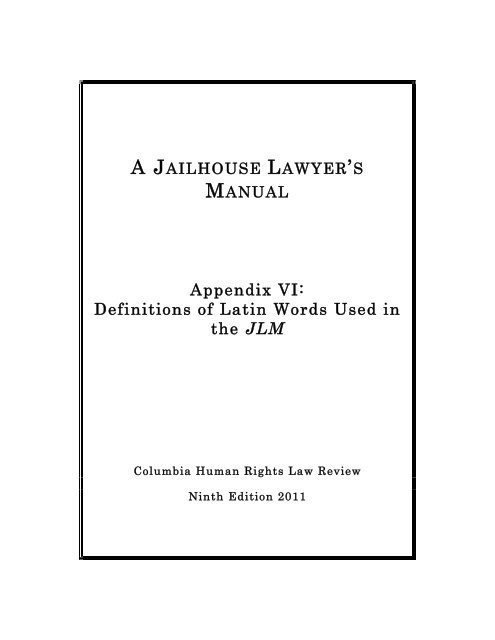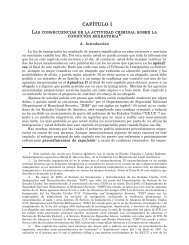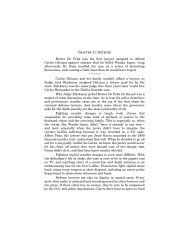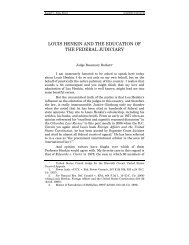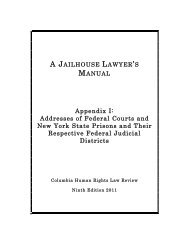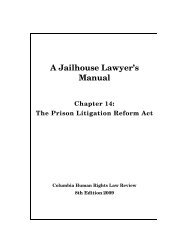Definitions of Latin Words Used in the JLM - Columbia Law School
Definitions of Latin Words Used in the JLM - Columbia Law School
Definitions of Latin Words Used in the JLM - Columbia Law School
You also want an ePaper? Increase the reach of your titles
YUMPU automatically turns print PDFs into web optimized ePapers that Google loves.
A JAILHOUSE LAWYER’S<br />
MANUAL<br />
Appendix VI:<br />
<strong>Def<strong>in</strong>itions</strong> <strong>of</strong> <strong>Lat<strong>in</strong></strong> <strong>Words</strong> <strong>Used</strong> <strong>in</strong><br />
<strong>the</strong> <strong>JLM</strong><br />
<strong>Columbia</strong> Human Rights <strong>Law</strong> Review<br />
N<strong>in</strong>th Edition 2011
LEGAL DISCLAIMER<br />
A Jailhouse <strong>Law</strong>yer’s Manual is written and updated by members <strong>of</strong> <strong>the</strong> <strong>Columbia</strong> Human Rights <strong>Law</strong><br />
Review. The law prohibits us from provid<strong>in</strong>g any legal advice to prisoners. This <strong>in</strong>formation is not <strong>in</strong>tended<br />
as legal advice or representation nor should you consider or rely upon it as such. Nei<strong>the</strong>r <strong>the</strong> <strong>JLM</strong> nor any<br />
<strong>in</strong>formation conta<strong>in</strong>ed here<strong>in</strong> is <strong>in</strong>tended to or shall constitute a contract between <strong>the</strong> <strong>JLM</strong> and any reader,<br />
and <strong>the</strong> <strong>JLM</strong> does not guarantee <strong>the</strong> accuracy <strong>of</strong> <strong>the</strong> <strong>in</strong>formation conta<strong>in</strong>ed here<strong>in</strong>. Additionally, your use <strong>of</strong><br />
<strong>the</strong> <strong>JLM</strong> should not be construed as creat<strong>in</strong>g an attorney-client relationship with <strong>the</strong> <strong>JLM</strong> staff or anyone at<br />
<strong>Columbia</strong> <strong>Law</strong> <strong>School</strong>. F<strong>in</strong>ally, while we have attempted to provide <strong>in</strong>formation that is up-to-date and useful,<br />
because <strong>the</strong> law changes frequently, we cannot guarantee that all <strong>in</strong>formation is current.
APPENDIX VI<br />
DEFINITIONS OF LATIN 1 WORDS USED IN THE <strong>JLM</strong> *<br />
Actus reus: The wrongful act or omission that is <strong>the</strong> physical component <strong>of</strong> a crime. This is one <strong>of</strong> <strong>the</strong><br />
necessary elements <strong>of</strong> a crime <strong>in</strong> crim<strong>in</strong>al law. Actus reus is <strong>the</strong> direct action used to commit a crime<br />
(compared with mens rea, which relates to <strong>the</strong> mental state <strong>of</strong> <strong>the</strong> accused and his crim<strong>in</strong>al <strong>in</strong>tent).<br />
Amicus curiae: <strong>Lat<strong>in</strong></strong> for “friend <strong>of</strong> <strong>the</strong> court,” an amicus curiae is someone who is not a party to <strong>the</strong><br />
litigation, but who believes that <strong>the</strong> court’s decision may affect his <strong>in</strong>terest, and may <strong>the</strong>refore volunteer to<br />
<strong>of</strong>fer <strong>in</strong>formation to assist a court <strong>in</strong> decid<strong>in</strong>g a matter before it. This <strong>in</strong>formation is <strong>of</strong>ten provided <strong>in</strong> a legal<br />
op<strong>in</strong>ion <strong>in</strong> <strong>the</strong> form <strong>of</strong> a brief (known as an amicus brief). The court has <strong>the</strong> discretion to decide whe<strong>the</strong>r or<br />
not to admit this <strong>in</strong>formation.<br />
Certiorari, Writ <strong>of</strong> (cert.): An order by an appellate (higher) court declar<strong>in</strong>g that it will review <strong>the</strong><br />
decision <strong>of</strong> a lower court on appeal. “Certiorari granted” means that <strong>the</strong> appellate court decided to approve a<br />
petition for certiorari and review <strong>the</strong> trial court’s decision. “Certiorari denied” means that <strong>the</strong> appellate court<br />
decided not to approve a petition for certiorari and, thus, not to review <strong>the</strong> lower court’s decision. Some<br />
courts, such as those <strong>in</strong> New York, simply call certiorari “leave to appeal.”<br />
Coram nobis (writ <strong>of</strong> coram nobis): An order for a court to review its own earlier decision because <strong>of</strong><br />
possible errors that were not obvious when <strong>the</strong> decision was made. These writs are usually used when no<br />
o<strong>the</strong>r remedy, such as direct appeal or habeas corpus is available, for <strong>in</strong>stance when a prisoner has already<br />
been convicted and completely served his prison sentence.<br />
Coram non judice: A legal term that is used to <strong>in</strong>dicate a legal proceed<strong>in</strong>g held without a judge, with<br />
improper venue, or without jurisdiction (mean<strong>in</strong>g “not <strong>in</strong> <strong>the</strong> presence <strong>of</strong> a judge”).<br />
Corpus delicti: The fact <strong>of</strong> a crime hav<strong>in</strong>g been actually committed. <strong>Lat<strong>in</strong></strong> for <strong>the</strong> “body <strong>of</strong> evidence,”<br />
corpus delicti refers to <strong>the</strong> pr<strong>in</strong>ciple that <strong>the</strong>re must be pro<strong>of</strong> that a crime has taken place before a person<br />
can be convicted <strong>of</strong> committ<strong>in</strong>g that crime. For example, <strong>in</strong> a murder case, this can refer to <strong>the</strong> actual body <strong>of</strong><br />
<strong>the</strong> victim or circumstantial evidence that prove death beyond a reasonable doubt.<br />
De facto: An action occurr<strong>in</strong>g <strong>in</strong> practice but which is not necessarily established by law. De facto is<br />
commonly used <strong>in</strong> contrast to de jure: When discuss<strong>in</strong>g a legal situation, de jure refers to what <strong>the</strong> law itself<br />
states, while de facto refers to what actually happens <strong>in</strong> practice.<br />
De jure: An action or regulation that is formally established by law. It is commonly used <strong>in</strong> contrast to de<br />
facto: When discuss<strong>in</strong>g a legal situation, de jure refers to what <strong>the</strong> law says, while de facto refers to what<br />
actually happens <strong>in</strong> practice.<br />
De m<strong>in</strong>imis: De m<strong>in</strong>imis is a <strong>Lat<strong>in</strong></strong> phrase describ<strong>in</strong>g th<strong>in</strong>gs that are <strong>in</strong>significant or small. If someth<strong>in</strong>g is<br />
de m<strong>in</strong>imis, it is ignored by <strong>the</strong> law and <strong>the</strong> courts for lack <strong>of</strong> importance. For example, a driver experiences<br />
a de m<strong>in</strong>imis <strong>in</strong>jury if his car is only slightly bumped by ano<strong>the</strong>r car, and he will not be successful if he tries<br />
to sue <strong>the</strong> person who bumped him for assault.<br />
!!!!!!!!!!!!!!!!!!!!!!!!!!!!!!!!!!!!!!!!!!!!!!!!!!!!!!!!!!!!!<br />
1 <strong>Lat<strong>in</strong></strong> phrases are italicized <strong>in</strong> legal writ<strong>in</strong>g. Therefore, if you submit any motions, briefs, compla<strong>in</strong>ts, etc.<br />
to <strong>the</strong> court, you should italicize any <strong>Lat<strong>in</strong></strong> phrases that you use.<br />
* <strong>Words</strong> that are def<strong>in</strong>ed elsewhere <strong>in</strong> this Appendix are pr<strong>in</strong>ted <strong>in</strong> italics.
App. VI DEFINITIONS OF LATIN WORDS 1075<br />
De novo: A standard <strong>of</strong> review that a court uses for certa<strong>in</strong> issues <strong>in</strong> a case on appeal. When a court reviews<br />
an issue with a de novo standard <strong>of</strong> review, it can decide <strong>the</strong> issue as though it was <strong>the</strong> court that heard <strong>the</strong><br />
case for <strong>the</strong> first time. In o<strong>the</strong>r words, <strong>the</strong> appellate (higher) court does not give any deference to <strong>the</strong> way <strong>in</strong><br />
which <strong>the</strong> trial (lower) court decided <strong>the</strong> issue.<br />
Dictum (plural: Dicta): A statement <strong>in</strong> a judge’s op<strong>in</strong>ion, about a question <strong>of</strong> law suggested by <strong>the</strong> case,<br />
that is not critical to <strong>the</strong> case’s hold<strong>in</strong>g. Dictum is not law and is not b<strong>in</strong>d<strong>in</strong>g on later courts because it is not<br />
<strong>the</strong> legal basis for <strong>the</strong> judge’s decision. In o<strong>the</strong>r words, later judges can choose to follow <strong>the</strong> legal analysis<br />
found <strong>in</strong> <strong>the</strong> dictum, but <strong>the</strong>y do not have to. The plural form <strong>of</strong> <strong>the</strong> word dictum is dicta.<br />
Ex post facto: A <strong>Lat<strong>in</strong></strong> phrase mean<strong>in</strong>g “from a th<strong>in</strong>g done afterward.” Ex post facto describes <strong>the</strong> situation<br />
where a new law applies to acts committed <strong>in</strong> <strong>the</strong> past. The U.S. Constitution prohibits ex post facto crim<strong>in</strong>al<br />
laws. This means that someone can only be punished under a law that was <strong>in</strong> effect at <strong>the</strong> time when he<br />
committed an <strong>of</strong>fense, and his punishment cannot be <strong>in</strong>creased if stricter laws are passed after he broke <strong>the</strong><br />
law. While ex post facto, or retroactive, crim<strong>in</strong>al law are not allowed, ex post facto civil laws are sometimes<br />
allowed.<br />
Ex parte: A <strong>Lat<strong>in</strong></strong> phrase mean<strong>in</strong>g “from (by or for) one party.” An ex parte motion or petition is one<br />
brought by one person or party <strong>in</strong> <strong>the</strong> absence <strong>of</strong>, and without representation or notification <strong>of</strong>, o<strong>the</strong>r parties.<br />
An ex parte judicial proceed<strong>in</strong>g is one where <strong>the</strong> oppos<strong>in</strong>g party has not received notice for <strong>the</strong> proceed<strong>in</strong>g<br />
and is not present for <strong>the</strong> decision. The availability <strong>of</strong> ex parte orders is limited by <strong>the</strong> Fifth and Fourteenth<br />
Amendments <strong>of</strong> <strong>the</strong> U.S. Constitution, which provide that a person shall not be deprived <strong>of</strong> his liberty or<br />
property without sufficient notice. Because <strong>of</strong> <strong>the</strong> absence <strong>of</strong> parties from ex parte proceed<strong>in</strong>gs, ex parte<br />
orders are usually temporary orders, such as restra<strong>in</strong><strong>in</strong>g orders, and any person(s) affected by <strong>the</strong> order are<br />
given an opportunity to contest it before it is made <strong>in</strong>to a permanent order.<br />
Ex rel. (ex relatione): A <strong>Lat<strong>in</strong></strong> phrase mean<strong>in</strong>g “by or on <strong>the</strong> relation <strong>of</strong>.” A lawsuit ex rel. is brought by<br />
<strong>the</strong> government if a private party (someone not act<strong>in</strong>g as a government <strong>of</strong>ficial) who is <strong>in</strong>terested <strong>in</strong> <strong>the</strong><br />
matter asks <strong>the</strong> government to br<strong>in</strong>g suit and <strong>the</strong> government agrees. For example, if Smith asks <strong>the</strong><br />
government to br<strong>in</strong>g a lawsuit aga<strong>in</strong>st Jones, <strong>the</strong> case would be written as “State ex rel. Smith v. Jones.”<br />
Guardian ad litem: A guardian appo<strong>in</strong>ted by a court to assist a m<strong>in</strong>or or o<strong>the</strong>r <strong>in</strong>capable defendant or<br />
pla<strong>in</strong>tiff <strong>in</strong> a particular legal matter. The guardian ad litem directs litigation <strong>in</strong> <strong>the</strong> best <strong>in</strong>terests <strong>of</strong> <strong>the</strong><br />
person that <strong>the</strong>y assist, <strong>of</strong>ten <strong>in</strong> juvenile or domestic relations matters.<br />
Habeas corpus (writ <strong>of</strong> habeas corpus): A <strong>Lat<strong>in</strong></strong> term referr<strong>in</strong>g to <strong>the</strong> form <strong>of</strong> relief that a court may<br />
grant <strong>in</strong> order to release a prisoner from unlawful imprisonment. The prisoner must prove that he is be<strong>in</strong>g<br />
held <strong>in</strong> violation <strong>of</strong> his rights, for <strong>in</strong>stance because his trial was unfair due to <strong>in</strong>effective assistance <strong>of</strong><br />
counsel. The habeas writ can be sought <strong>in</strong> both state and federal courts. For more <strong>in</strong>formation on habeas<br />
corpus, see Chapters 13 and 21 <strong>of</strong> <strong>the</strong> <strong>JLM</strong>.<br />
In forma pauperis: A <strong>Lat<strong>in</strong></strong> term, mean<strong>in</strong>g “like a poor person.” A court will allow someone without money<br />
to proceed <strong>in</strong> forma pauperis and avoid pay<strong>in</strong>g all fil<strong>in</strong>g fees and o<strong>the</strong>r court costs. A crim<strong>in</strong>al defendant who<br />
proceeds <strong>in</strong> forma pauperis will also usually have a defense lawyer appo<strong>in</strong>ted free <strong>of</strong> charge.<br />
In absentia: Mean<strong>in</strong>g “<strong>in</strong> <strong>the</strong> absence,” this term usually perta<strong>in</strong>s to a defendant's right to be present <strong>in</strong><br />
court proceed<strong>in</strong>gs <strong>in</strong> a crim<strong>in</strong>al trial. U.S. courts have held that <strong>the</strong> Constitution protects a crim<strong>in</strong>al<br />
defendant's right to appear <strong>in</strong> person at <strong>the</strong>ir trial, as a matter <strong>of</strong> due process; however, <strong>the</strong>re are certa<strong>in</strong><br />
exceptions to <strong>the</strong> rule, <strong>in</strong>clud<strong>in</strong>g <strong>the</strong> defendant’s waiver <strong>of</strong> his right to be present by voluntarily leav<strong>in</strong>g <strong>the</strong><br />
trial after it has started.
1076 A JAILHOUSE LAWYER’S MANUAL App. VI<br />
Malum <strong>in</strong> se: An <strong>of</strong>fense that is malum <strong>in</strong> se is one which is seen as wrong <strong>in</strong> and <strong>of</strong> itself, such as murder<br />
or <strong>the</strong>ft. While <strong>the</strong>re are laws aga<strong>in</strong>st malum <strong>in</strong> se crimes, <strong>the</strong>y are viewed as wrong because <strong>of</strong> <strong>the</strong>ir<br />
<strong>in</strong>herent evilness, not because <strong>of</strong> <strong>the</strong> laws prohibit<strong>in</strong>g <strong>the</strong>m. Malum <strong>in</strong> se <strong>of</strong>fenses are dist<strong>in</strong>guished from<br />
malum prohibitum crimes, which are wrong only because <strong>the</strong>y are prohibited by law.<br />
Malum prohibitum: Malum prohibitum crimes are crimes that are wrong because <strong>the</strong>y have been<br />
prohibited by law. These crimes can <strong>the</strong>refore vary from jurisdiction to jurisdiction depend<strong>in</strong>g on what <strong>the</strong><br />
legislatures decide <strong>the</strong> law should be. An example <strong>of</strong> a malum prohibitum crime is speed<strong>in</strong>g. Driv<strong>in</strong>g at 70<br />
miles per hour is not a bad act by itself. It is only bad when <strong>the</strong> law has set a speed limit to be under 70<br />
miles per hour, so that anyone exceed<strong>in</strong>g <strong>the</strong> speed limit is break<strong>in</strong>g a law. As dist<strong>in</strong>guished from malum <strong>in</strong><br />
se crimes which are morally wrong, malum prohibitum crimes are not wrong on <strong>the</strong>ir own but are wrong<br />
because <strong>the</strong> law declares it to be wrong.<br />
Modus operandi (M.O.): Mean<strong>in</strong>g “method <strong>of</strong> operat<strong>in</strong>g,” this term is used to describe someone's habits or<br />
manner <strong>of</strong> work<strong>in</strong>g and function<strong>in</strong>g. In a crim<strong>in</strong>al context, modus operandi can be used to identify a culprit<br />
based on a characteristic pattern <strong>of</strong> methods <strong>of</strong> a repeated crim<strong>in</strong>al act.<br />
Mens rea: <strong>Lat<strong>in</strong></strong> for “guilty m<strong>in</strong>d,” mens rea is <strong>the</strong> mental state, or state <strong>of</strong> m<strong>in</strong>d when a crim<strong>in</strong>al act is<br />
committed. Mens rea is one <strong>of</strong> <strong>the</strong> necessary elements <strong>of</strong> a crime <strong>in</strong> crim<strong>in</strong>al law. Mens rea relates to <strong>the</strong><br />
mental state <strong>of</strong> <strong>the</strong> accused, as compared with actus reus relates to <strong>the</strong> direct physical action used to commit<br />
a crime.<br />
Nolle prosequi: A declaration made before or dur<strong>in</strong>g trial declar<strong>in</strong>g that <strong>the</strong> case aga<strong>in</strong>st a defendant is<br />
be<strong>in</strong>g dropped. This can be made <strong>in</strong> a crim<strong>in</strong>al case by <strong>the</strong> prosecutor, or <strong>in</strong> a civil lawsuit by <strong>the</strong> pla<strong>in</strong>tiff. A<br />
nolle prosequi declaration may be made for many reasons, <strong>in</strong>clud<strong>in</strong>g because <strong>the</strong> charges aga<strong>in</strong>st <strong>the</strong><br />
defendant cannot be proven, because <strong>the</strong> prosecutor no longer th<strong>in</strong>ks that <strong>the</strong> accused defendant is guilty,<br />
and/or because <strong>the</strong> accused has died.<br />
Nolo contendere: When a defendant pleads nolo contendere, he is stat<strong>in</strong>g “no contest,” mean<strong>in</strong>g that he<br />
does not deny responsibility for <strong>the</strong> charges; however, he is not explicitly admitt<strong>in</strong>g guilt ei<strong>the</strong>r. A crim<strong>in</strong>al<br />
defendant’s nolo contendere plea differs from a guilty plea because it cannot be used aga<strong>in</strong>st him <strong>in</strong> ano<strong>the</strong>r<br />
cause <strong>of</strong> action. Because <strong>of</strong> this, some defendants plead nolo contendere to avoid civil suits that may arise<br />
from a crim<strong>in</strong>al conviction.<br />
Per curiam: A court decision made per curiam is one that refers to a decision handed down by <strong>the</strong> court as<br />
a whole act<strong>in</strong>g collectively and anonymously, without identify<strong>in</strong>g any <strong>in</strong>dividual judge as <strong>the</strong> author.<br />
Per se: A <strong>Lat<strong>in</strong></strong> phrase mean<strong>in</strong>g “by itself” or “<strong>in</strong> itself.” For example, <strong>in</strong> consider<strong>in</strong>g a habeas petition, a<br />
court may consider that a violation was “per se prejudicial” and not require you to present fur<strong>the</strong>r evidence<br />
to prove you were prejudiced (harmed) because <strong>the</strong> court has already assumed that you were prejudiced<br />
s<strong>in</strong>ce <strong>the</strong> violation is considered to be “per se prejudicial.”<br />
Prima facie case: The facts sufficient to allow <strong>the</strong> judge or jury to f<strong>in</strong>d <strong>in</strong> a party’s favor if everyth<strong>in</strong>g he<br />
said were undisputed by <strong>the</strong> o<strong>the</strong>r side.<br />
Pro se: A <strong>Lat<strong>in</strong></strong> phrase mean<strong>in</strong>g “for oneself.” Someone who appears <strong>in</strong> court pro se is represent<strong>in</strong>g himself<br />
without <strong>the</strong> services <strong>of</strong> a lawyer.<br />
Res ipsa loquitur: A <strong>Lat<strong>in</strong></strong> phrase mean<strong>in</strong>g “<strong>the</strong> th<strong>in</strong>g speaks for itself.” In tort claims <strong>of</strong> negligence, res<br />
ipsa loquitur describes certa<strong>in</strong> situations where it can be assumed (without hav<strong>in</strong>g to be proven) that an<br />
<strong>in</strong>dividual’s <strong>in</strong>jury was caused by <strong>the</strong> negligent action <strong>of</strong> ano<strong>the</strong>r party because <strong>the</strong> accident was <strong>the</strong> sort<br />
that would not have occurred unless someone were negligent.
App. VI DEFINITIONS OF LATIN WORDS 1077<br />
Res judicata: A legal concept that requires that, when issues have already been determ<strong>in</strong>ed by a court,<br />
<strong>the</strong>y are not allowed to be re-litigated, because <strong>the</strong> court’s determ<strong>in</strong>ation is f<strong>in</strong>al. This notion may also be<br />
called “collateral estoppel” and “issue preclusion.”<br />
Respondeat superior: Most commonly used <strong>in</strong> tort claims, respondeat superior is a legal doctr<strong>in</strong>e which<br />
states that an employer or o<strong>the</strong>r ‘pr<strong>in</strong>cipal’ can be held to be legally responsible for <strong>the</strong> wrongful acts <strong>of</strong> his<br />
employee or agent, if such acts occur with<strong>in</strong> <strong>the</strong> scope <strong>of</strong> <strong>the</strong> employment or agency. This vicarious liability<br />
rule may also be called <strong>the</strong> ‘master-servant rule.’<br />
Stare decisis: <strong>Lat<strong>in</strong></strong> for “to stand by th<strong>in</strong>gs decided,” stare decisis is <strong>the</strong> basic legal pr<strong>in</strong>ciple that a court<br />
should follow <strong>the</strong> rules, or ‘precedent,’ established by a court above it (a higher court) or by prior courts. This<br />
is so that judges and courts do not disturb settled matters and <strong>the</strong> law rema<strong>in</strong>s predictable and uniform <strong>in</strong><br />
application. Courts cite to stare decisis when a particular issue has been previously brought to <strong>the</strong> court and<br />
a rul<strong>in</strong>g already made on that issue. While courts will generally adhere to <strong>the</strong> previous rul<strong>in</strong>g, this is not<br />
universally true.<br />
Sua sponte: Mean<strong>in</strong>g “<strong>of</strong> one’s own will,” this usually refers to a judge’s order made without a request by<br />
any party to <strong>the</strong> case. Where grounds for dismissal exist, an action is subject to dismissal on a court’s own<br />
motion. A trial court has <strong>the</strong> power to dismiss such an action sua sponte. An example <strong>of</strong> a situation where a<br />
trial court could dismiss an action sua sponte would be where <strong>the</strong>re was a failure to comply with <strong>the</strong> rules <strong>of</strong><br />
civil procedure or where <strong>the</strong> judge has determ<strong>in</strong>ed that his court does not have jurisdiction over <strong>the</strong> case at<br />
issue.<br />
Sub judice: <strong>Used</strong> to <strong>in</strong>dicate that a particular case or matter is before <strong>the</strong> court and under judicial<br />
consideration.<br />
Subpoena: A command that a person must appear before <strong>the</strong> court, subject to a penalty if <strong>the</strong>y do not<br />
appear.<br />
Subpoena duces tecum: Mean<strong>in</strong>g “br<strong>in</strong>g with you under penalty <strong>of</strong> punishment,” a subpoena duces tecum<br />
is an order for <strong>the</strong> witness to appear before <strong>the</strong> court and to br<strong>in</strong>g specified items.


